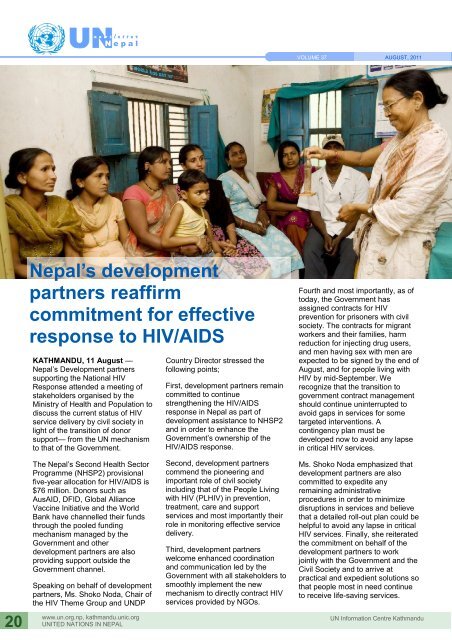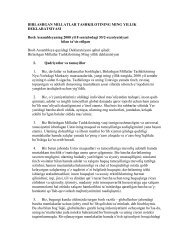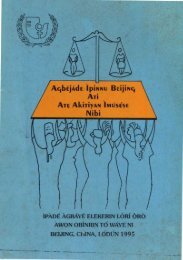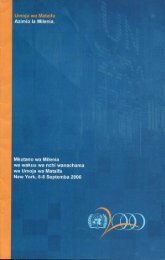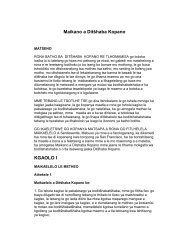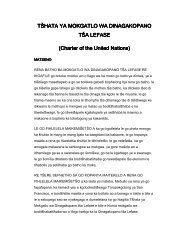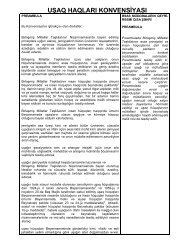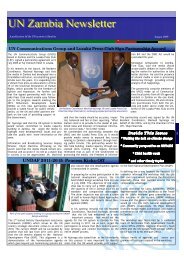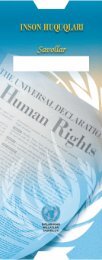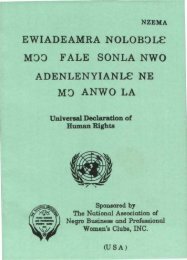Download Newsletter - United Nations Information Centres
Download Newsletter - United Nations Information Centres
Download Newsletter - United Nations Information Centres
Create successful ePaper yourself
Turn your PDF publications into a flip-book with our unique Google optimized e-Paper software.
20<br />
UN n e w s l e t t e r<br />
N e p a l<br />
Nepal’s development<br />
partners reaffirm<br />
commitment for effective<br />
response to HIV/AIDS<br />
KATHMANDU, 11 August —<br />
Nepal‘s Development partners<br />
supporting the National HIV<br />
Response attended a meeting of<br />
stakeholders organised by the<br />
Ministry of Health and Population to<br />
discuss the current status of HIV<br />
service delivery by civil society in<br />
light of the transition of donor<br />
support— from the UN mechanism<br />
to that of the Government.<br />
The Nepal‘s Second Health Sector<br />
Programme (NHSP2) provisional<br />
five-year allocation for HIV/AIDS is<br />
$76 million. Donors such as<br />
AusAID, DFID, Global Alliance<br />
Vaccine Initiative and the World<br />
Bank have channelled their funds<br />
through the pooled funding<br />
mechanism managed by the<br />
Government and other<br />
development partners are also<br />
providing support outside the<br />
Government channel.<br />
Speaking on behalf of development<br />
partners, Ms. Shoko Noda, Chair of<br />
the HIV Theme Group and UNDP<br />
www.un.org.np, kathmandu.unic.org<br />
UNITED NATIONS IN NEPAL<br />
Country Director stressed the<br />
following points;<br />
First, development partners remain<br />
committed to continue<br />
strengthening the HIV/AIDS<br />
response in Nepal as part of<br />
development assistance to NHSP2<br />
and in order to enhance the<br />
Government‘s ownership of the<br />
HIV/AIDS response.<br />
Second, development partners<br />
commend the pioneering and<br />
important role of civil society<br />
including that of the People Living<br />
with HIV (PLHIV) in prevention,<br />
treatment, care and support<br />
services and most importantly their<br />
role in monitoring effective service<br />
delivery.<br />
Third, development partners<br />
welcome enhanced coordination<br />
and communication led by the<br />
Government with all stakeholders to<br />
smoothly implement the new<br />
mechanism to directly contract HIV<br />
services provided by NGOs.<br />
VOLUME 37 AUGUST, 2011<br />
Fourth and most importantly, as of<br />
today, the Government has<br />
assigned contracts for HIV<br />
prevention for prisoners with civil<br />
society. The contracts for migrant<br />
workers and their families, harm<br />
reduction for injecting drug users,<br />
and men having sex with men are<br />
expected to be signed by the end of<br />
August, and for people living with<br />
HIV by mid-September. We<br />
recognize that the transition to<br />
government contract management<br />
should continue uninterrupted to<br />
avoid gaps in services for some<br />
targeted interventions. A<br />
contingency plan must be<br />
developed now to avoid any lapse<br />
in critical HIV services.<br />
Ms. Shoko Noda emphasized that<br />
development partners are also<br />
committed to expedite any<br />
remaining administrative<br />
procedures in order to minimize<br />
disruptions in services and believe<br />
that a detailed roll-out plan could be<br />
helpful to avoid any lapse in critical<br />
HIV services. Finally, she reiterated<br />
the commitment on behalf of the<br />
development partners to work<br />
jointly with the Government and the<br />
Civil Society and to arrive at<br />
practical and expedient solutions so<br />
that people most in need continue<br />
to receive life-saving services.<br />
UN <strong>Information</strong> Centre Kathmandu


